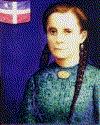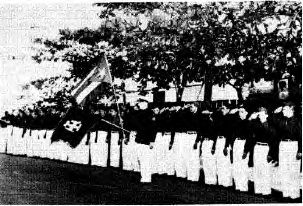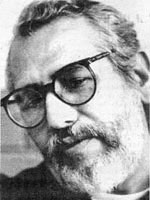 W
WPedro Albizu Campos was a Puerto Rican attorney and politician, and the leading figure in the Puerto Rican independence movement. Gifted in languages, he spoke six. He graduated from Harvard Law School with the highest grade point average in his law class, an achievement that earned him the right to give the valedictorian speech at his graduation ceremony. However, animus towards his mixed racial heritage led to his professors delaying two of his final exams in order to keep Albizu Campos from graduating on time. During his time at Harvard University he became involved in the Irish struggle for independence.
 W
WMaría de las Mercedes Barbudo was a Puerto Rican political activist, the first woman Independentista in the island, and a "Freedom Fighter". At the time, the Puerto Rican independence movement had ties with the Venezuelan rebels led by Simón Bolívar.
 W
WCasimiro Berenguer Padilla was a Puerto Rican nationalist. He was the military instructor of the Cadets of the Republic who received permission from Ponce Mayor Tormos Diego to celebrate a parade on March 21, 1937, in commemoration of the abolition of slavery and to protest the jailing of its leaders, including Pedro Albizu Campos. The parade resulted in the police riot known as the Ponce massacre.
 W
WMariana Bracetti Cuevas (1825–1903) was a patriot and leader of the Puerto Rico independence movement in the 1860s. She is attributed with having knitted the flag that was intended to be used as the national emblem of Puerto Rico in its attempt to overthrow the Spanish government on the island, and to establish the island as a sovereign republic. The attempted overthrow was the Grito de Lares, and Bracetti's creation became known as "The Flag of Lares." The flag's design was later adopted as the official flag of the municipality of Lares, Puerto Rico.
 W
WBlanca Canales was an educator and a Puerto Rican Nationalist. Canales joined the Puerto Rican Nationalist Party in 1931 and helped organize the Daughters of Freedom, the women's branch of the Puerto Rican Nationalist Party.
 W
WRafael Cancel Miranda was a poet, political activist, member of the Puerto Rican Nationalist Party and an advocate of Puerto Rican independence. On March 1, 1954, Cancel Miranda and three other Nationalists attacked the United States Capitol building, firing 30 shots and injuring five congressmen. The four were arrested, convicted, and sentenced to long prison terms. In 1979, Cancel Miranda's sentence was commuted by United States President Jimmy Carter.
 W
WOscar Collazo was one of two Puerto Rican militants of the Nationalist Party who on November 1, 1950, attempted to assassinate U.S. President Harry S. Truman in Washington, DC. He had been living in New York City after growing up in Puerto Rico.
 W
WJuan Antonio Corretjer Montes was a Puerto Rican poet, journalist and pro-independence political activist opposing United States rule in Puerto Rico.
 W
WRaimundo Díaz Pacheco was a political activist and the Treasurer General of the Puerto Rican Nationalist Party. He was also commander-in-chief of the Cadets of the Republic, the official youth organization within the Puerto Rican Nationalist Party. This quasi-military organization was also known as the Ejército Libertador de Puerto Rico.
 W
WAndres Figueroa Cordero was a political activist, member of the Puerto Rican Nationalist Party and an advocate of Puerto Rican independence. On March 1, 1954, Figueroa Cordero together with fellow Nationalists Lolita Lebrón, Irvin Flores, and Rafael Cancel Miranda entered the United States Capitol building armed with automatic pistols and fired 30 shots. Five congressmen were wounded, however all the representatives survived and Figueroa Cordero, along with the other three members of his group were immediately arrested.
 W
WIrvin Flores was a political activist, member of the Puerto Rican Nationalist Party and an advocate of Puerto Rican independence. Flores was a leader of the Nationalist faction of Mayagüez, Puerto Rico during the Puerto Rican Nationalist Party revolts of the 1950s. On March 1, 1954, Flores together with fellow Nationalists Lolita Lebrón, Andrés Figueroa Cordero, and Rafael Cancel Miranda entered the United States Capitol building armed with automatic pistols and fired 30 shots. Five congressmen were wounded, however all the representatives survived and Flores, along with the other three members of his group were immediately arrested.
 W
WIsabel Freire de Matos was a writer, educator, journalist, and activist for Puerto Rican independence. Freire de Matos was the author of several children's books and the wife of Francisco Matos Paoli, a high-ranking member of the Puerto Rican Nationalist Party.
 W
WAvelino González-Claudio is a Puerto Rican independence activist who served time in a U.S. federal prison for his participation in an armored truck robbery planned by Los Macheteros. Although the robbery took place in 1983, González-Claudio was not apprehended until 25 years later, in 2008. After pleading guilty to conspiracy to commit robbery, González-Claudio was sentenced to seven years in prison in 2010. He was released three years later, in 2013.
 W
WLolita Lebrón was a Puerto Rican nationalist who was convicted of attempted murder and other crimes after carrying out an armed attack on the United States Capitol in 1954, which resulted in the wounding of five members of the United States Congress. She was released from prison in 1979 after being granted clemency by President Jimmy Carter. Lebrón was born and raised in Lares, Puerto Rico, where she joined the Puerto Rican Liberal Party. In her youth she met Francisco Matos Paoli, a Puerto Rican poet, with whom she had a relationship. In 1941, Lebrón migrated to New York City, where she joined the Puerto Rican Nationalist Party, gaining influence within the party's leadership.
 W
WTomás López de Victoria (1911–????) was a political activist and the Sub-Commander of the Cadets of the Republic. These cadets were the official youth organization within the Puerto Rican Nationalist Party. They were also known as the Ejército Libertador de Puerto Rico.
 W
WOscar López Rivera is a Puerto Rican activist and militant who was a member and suspected leader of the Fuerzas Armadas de Liberación Nacional Puertorriqueña (FALN), a clandestine paramilitary organization devoted to Puerto Rican independence that carried out more than 130 bomb attacks in the United States between 1974 and 1983. López Rivera was tried by the United States government for seditious conspiracy, use of force to commit robbery, interstate transportation of firearms, and conspiracy to transport explosives with intent to destroy government property.
 W
WFrancisco Matos Paoli March 9, 1915 – July 10, 2000), was a Puerto Rican poet, critic, and essayist who in 1977 was nominated for the Nobel Prize in Literature. His books were rooted in three major literary movements in Latin America: Romanticism, Modernism, and Postmodernism.
 W
WFiliberto Ojeda Ríos was a Puerto Rican independence activist and militant who cofounded the Boricua Popular Army, also known as Los Macheteros, and its predecessor, the Fuerzas Armadas de Liberación Nacional Puertorriqueña (FALN). In 1990, Ojeda Ríos became a fugitive of the Federal Bureau of Investigation (FBI), wanted for his role in the 1983 Águila Blanca heist as well as a bail bond default on September 23 of that year. On September 23 2005, he was killed during an exchange of gunfire with FBI agents after they surrounded the house in Hormigueros, Puerto Rico.
 W
WDr. José Gualberto Padilla, also known as El Caribe, was a physician, poet, journalist, politician, and advocate for Puerto Rico's independence. He suffered imprisonment and constant persecution by the Spanish Crown in Puerto Rico because his patriotic verses, social criticism and political ideals were considered a threat to Spanish Colonial rule of the island.
Francisco Ramírez Medina, was one of the leaders of "El Grito de Lares", the first major revolt against Spanish rule and call for independence in Puerto Rico in 1868. He has thus far been the only person to be named "President of the Republic of Puerto Rico".
 W
WRuth Mary Reynolds was an American educator, political and civil rights activist who embraced the ideals of the Puerto Rican Nationalist Party. She was incarcerated in La Princesa Prison for sedition during the Puerto Rican Nationalist Party Revolts of the 1950s. As one of the founders of the organization known as the "American League for Puerto Rico's Independence," she devoted many years of her life to the cause of Puerto Rico's independence from the United States after her release from prison.
 W
WCommander Manuel Rojas was a Puerto Rican-Venezuelan commander of the Puerto Rican Liberation Army and one of the main leaders of the Grito de Lares uprising against Spanish rule in Puerto Rico.
 W
WIsabel Rosado, a.k.a. Doña Isabelita, was an educator, social worker, activist and member of the Puerto Rican Nationalist Party. Influenced by the events of the Ponce massacre, Rosado became a believer of the Puerto Rican independence movement and was imprisoned because of her commitment to the cause.
 W
WVidal Santiago Díaz was a member of the Puerto Rican Nationalist Party and served as president of the Santurce Municipal Board of officers of the party. He was also the personal barber of Nationalist leader Pedro Albizu Campos. Though not involved in the Puerto Rican Nationalist Party Revolts of the 1950s, Santiago Díaz's barbershop was attacked by forty armed police officers and U.S. National Guardsmen. The attack was historic in Puerto Rico—the first time an event of that magnitude had ever been transmitted live via radio and heard all over the island.
 W
WClemente Soto Vélez was a Puerto Rican nationalist, poet, journalist and activist who mentored many generations of artists in Puerto Rico and New York City. Upon his death in 1993, he left a rich legacy that contributed to the cultural, social and economic life of Puerto Ricans in New York and Latinos everywhere.
 W
WCarlos Alberto Torres is a member of Puerto Rico's independence movement. He was convicted and sentenced to 78 years in a U.S. federal prison for seditious conspiracy, conspiring to use force against the lawful authority of the United States. He served 30 years and was released on July 26, 2010.
 W
WGriselio Torresola Roura born in Jayuya, Puerto Rico, was one of two Puerto Rican nationalists from New York City who attempted to assassinate United States President Harry Truman on November 1, 1950. Torresola mortally wounded White House policeman Private Leslie Coffelt and wounded two other law enforcement officers. Torresola was killed by a return shot from Coffelt.
 W
WCarlos Vélez Rieckehoff was the President of the New York chapter of the Puerto Rican Nationalist Party in the 1930s. In the 1990s Rieckehoff was among the protesters against the United States Navy's use of his birthplace, the island of Vieques, as a bombing range. He stood in front of the committee of the U.S. House of Representatives investigating the situation in Vieques and pleaded for the return of Vieques to the people of Puerto Rico.
Olga Isabel Viscal Garriga was a public orator and political activist. Born in Brooklyn, New York, she moved to Puerto Rico, where she was a student leader and spokesperson of the Puerto Rican Nationalist Party's branch in Rio Piedras. As an advocate for Puerto Rican independence, she was sentenced to eight years in a U.S. federal penitentiary, for refusing to recognize the sovereign authority of the United States over Puerto Rico.